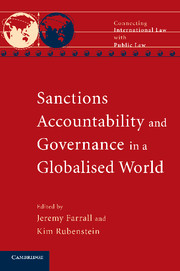Book contents
- Frontmatter
- Contents
- Contributors
- Series editors' preface
- Editors' preface
- Introduction: Filling or falling between the cracks? Law's potential
- PART I Setting down the foundations
- PART II Internationalising public law
- 3 Globalisation and public law: A global administrative law?
- 4 The deliberative deficit: Transparency, access to information and UN sanctions
- 5 Who guards the guardian? Towards regulation of the UN Security Council's Chapter VII powers through dialogue
- 6 Holding the United Nations Security Council accountable for human rights violations through domestic and regional courts: A case of ‘be careful what you wish for’?
- PART III Implementing Security Council sanctions
- PART IV The place of corporations
- PART V The role of lawyers
- PART VI Public law and public policy
- PART VII Parallel case studies
- Concluding remarks
- Bibliography
- Index
6 - Holding the United Nations Security Council accountable for human rights violations through domestic and regional courts: A case of ‘be careful what you wish for’?
Published online by Cambridge University Press: 05 October 2010
- Frontmatter
- Contents
- Contributors
- Series editors' preface
- Editors' preface
- Introduction: Filling or falling between the cracks? Law's potential
- PART I Setting down the foundations
- PART II Internationalising public law
- 3 Globalisation and public law: A global administrative law?
- 4 The deliberative deficit: Transparency, access to information and UN sanctions
- 5 Who guards the guardian? Towards regulation of the UN Security Council's Chapter VII powers through dialogue
- 6 Holding the United Nations Security Council accountable for human rights violations through domestic and regional courts: A case of ‘be careful what you wish for’?
- PART III Implementing Security Council sanctions
- PART IV The place of corporations
- PART V The role of lawyers
- PART VI Public law and public policy
- PART VII Parallel case studies
- Concluding remarks
- Bibliography
- Index
Summary
Background
The legal framework
I have previously argued extensively that the competence of the United Nations Security Council to adopt measures in the interest of international peace and security is not unlimited under international law. In addition, I have argued that due to the absence of a centralised international judiciary that has explicit competence to review the legality of Security Council decisions, domestic and regional courts will increasingly be confronted with requests to this effect in an era where international organs frequently take decisions with direct consequences for the rights of individuals. In particular, such review may occur in cases where domestic or regional courts are confronted with challenges to domestic or regional measures that implement Security Council resolutions in a manner that results in the infringement of individual human rights. When reviewing these implementation measures, the domestic or regional courts may also be incidentally confronted with the question of whether the Security Council itself acted in accordance with international law when adopting the decision that ultimately resulted in the measure under debate.
As far as the legal obligations to which the Security Council itself is bound under international law are concerned, I have argued extensively that when the Security Council creates subsidiary organs exercising (quasi) judicial functions, such organs have to function in accordance with basic standards of procedural justice; notably, the principles of independence, even-handedness and impartiality.
- Type
- Chapter
- Information
- Sanctions, Accountability and Governance in a Globalised World , pp. 143 - 168Publisher: Cambridge University PressPrint publication year: 2009
- 2
- Cited by

